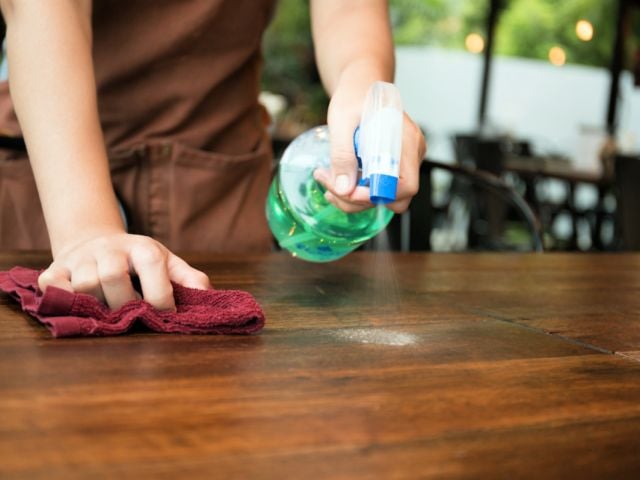
Before you start any kind of home cleaning, think twice about what products you’re using. Many cleaners use toxic chemicals that can cause health harms. One of the most common is also one of the most toxic – sodium hypochlorite.
Also known as chlorine bleach, sodium hypochlorite is an active ingredient in over 300 disinfectants and cleaners and laundry detergents, among other household products. Although it’s a powerful agent to eliminate bacteria and stains, this efficiency comes at a cost.
According to the Centers for Disease Control and Prevention, exposure to sodium hypochlorite is linked to respiratory irritation, asthma and other health harms. Mild reactions to the substance include irritation and burning of the skin, nose and eyes. It also can irritate the respiratory tract. Its fumes can cause dizziness, headaches and nausea. Exposure to sodium hypochlorite is one of the most frequent reasons for calls to poison control centers.
When used improperly, the effects can be deadly. Mixing sodium hypochlorite with acids or other cleaning products can produce toxic chlorine gas. A single, high-level exposure to chlorine gas has the potential to cause long-lasting effects like asthma. A mixture of sodium hypochlorite and ammonia can lead to potentially fatal chloramine poisoning.
Household harms
Sodium hypochlorite isn’t the only chemical that you may be exposed to while cleaning your home.
Studies show many household cleaning products contain toxic chemicals and are significant sources of indoor air pollution. One study found that the frequent use of cleaning products increases the risk of childhood asthma.
Another recent EWG study found that common cleaning products contain hundreds of volatile organic compounds, or VOCs, linked to cancer and other health harms. The study was published in Chemosphere and analyzed 30 cleaning products, including multipurpose and glass cleaners, air fresheners and more.
Thanks to a state law passed by California’s legislature in 2017, many of these toxic chemicals must now be disclosed, either on the package or through a website. The size of California's economy has forced brands to provide consumers across the U.S. with access to more information about chemicals in cleaning products.
The DARK Act
But a new bill introduced in Congress on behalf of leading household cleaning product manufacturers would block the California law, and prevent other states from pursuing similar measures. If enacted, it would deny consumers the right to know about toxic chemicals in cleaning products. The bill is supported by numerous companies, including S.C. Johnson and Reckitt, that had pledged to oppose federal blocking.
By supporting the new bill, introduced by Rep. Larry Bucshon (R-Ind.), these companies, through their trade association, are no longer honoring their pledge to oppose federal preemption and are working to prevent their consumers from informing themselves.
Only Clorox, Henkel and Seventh Generation have so far opposed the new bill and pledged to honor their original agreement.
Consumer advocates have labeled the industry bill the Deny Americans the Right to Know, or DARK, Act. This legislation not only seeks to override state laws but establishes an endless rulemaking process that, at best, would yield a far weaker chemical disclosure system. The enactment of this bill would, without a doubt, result in a significantly reduced disclosure of chemicals, and significantly less informed consumers.



